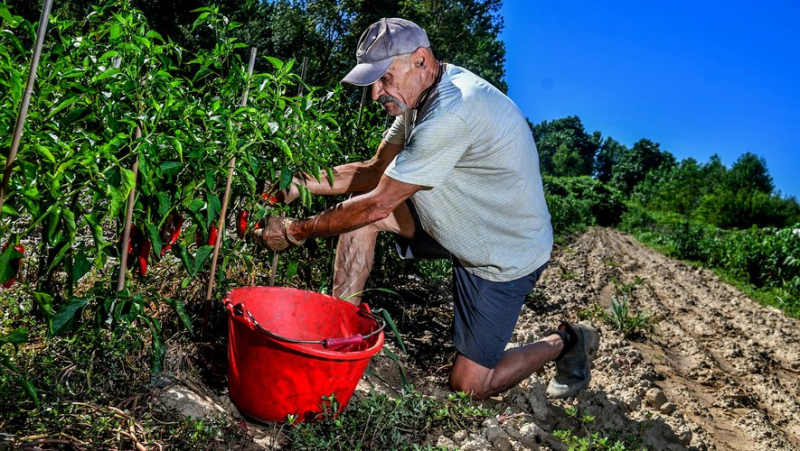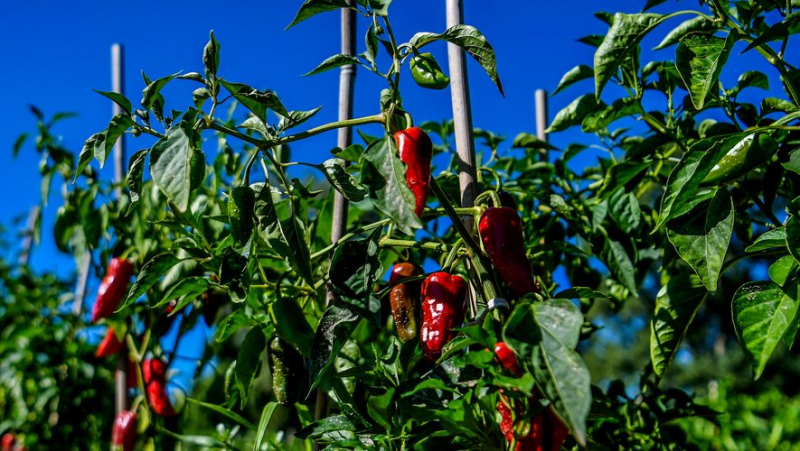Organic Cévennes chili pepper, a “hot but not spicy” condiment

Harvesting “Organic Cévennes pepper” with market gardener Christian Colautti from the Cissou farm Midi Free – ALEXIS BETHUNE

The Cévennes pepper is slowly reaching maturity at the Cissou farm in Ners. Midi Libre – ALEXIS BETHUNE
Christian Colautti from the Cissou farm reveals the secrets of producing organic Cévennes pepper.
"It's a hot pepper, but it doesn't sting and is very fruity“, reassures Christian Colautti, market gardener at the Cissou farm in Ners. Hot like this new day of heatwave in August. In the middle of the farmer's land, cultivated without phytosanitary products, the songs of the European bee-eaters resonate and the herbs flirt with the peppers “so that the sun does not burn the fruits“.
A trademark registered with the National Institute of Industrial Property (INPI), the Piment des Cévennes was created by Brigitte and Christian Colautti in 2015 after “five years of testing to satisfy restaurateurs“. Their perseverance has led them to work with many professionals “who have learned to dose” the chilli pepper to combine it with different preparations. Quality recognized by the jury of the Alès Audace competition in 2016.
Consciousness and patience for a diversity of senses
Combining the practices of organic farming, permaculture and a specification specific to the organic Cévennes pepper, the market gardeners carry out their sowing and plant, “from the first week of May, 8,000 to 10,000 plants” of the future red jewel. The hand harvest begins in August and continues until the first frosts. "The fruit, even red, is picked when it is fully ripe. It must come off by itself.” Then, it is stalked, seeded, dried and ground to produce on average per year, 100 kg of powdered chili peppers and 20 to 30 kg of jelly. “Espelette pepper is crushed with the seeds, which gives it bitterness. We remove the seeds from ours. It's a lot of labor, but we're taste activists, and that's not for nothing.”
These preparations thus join the kitchens of restaurateurs like Jérôme Nutile in Nîmes or Emmanuelle and François-Xavier Durieu of the Textures restaurant. They are also incorporated into the nougats of Sylvie and Philippe Dura in Allègre-les-Fumades, the wines of the Coulorgues estate of Frédéric Koutch or the chocolates of Alfonso Canarosso, who in exchange provides the market gardener with the pods used to form mulch at the foot of the plants after crushing. In permaculture, nothing is lost, everything is transformed. Individuals are not left out since the production is sold at some of these resellers but also directly at the farm or by shipment.
In addition to peppers, the Cissou farm also produces organic heirloom tomatoes, melons, eggplants, Italian lipari peppers, cucumbers, potatoes and carrots. In winter, it is the turn of squashes such as the “real pumpkin called chacha” and the patidou. No break for Christian Colautti and his retired wife, Brigitte, who handle all of the production alone.
Meeting the producers
Direct sales (peppers and other fruits and vegetables) at 156, rue du Château à Ners the following days: Tuesday from 2 p.m. to 7 p.m., Friday from 8:30 a.m. to 7 p.m. and Saturday morning from 8:30 a.m. to 12:30 p.m.
Guided tour of the production sites on Saturday by appointment.
Contact Christian Colautti at 06.03.79.49.30
I subscribe to read the rest




